Print Entire Issue

KeePosted Info
Features
Do You Know an Outstanding Mentor?
Do You Know an Outstanding Illinois Pharmacist?
It’s an Award for the Brightest of Our Rising Stars!
Call for Entries: 2014 Best Practice Award
Columns
President's Message
Directly Speaking
Educational Affairs
Leadership Profile
Board of Pharmacy Update
ICHPeople
The GAS From Springfield
New Practitioners Network
College Connections
My First Experience at Legislative Day
Meals from the Heart – A Reflection from the Heart
More
Officers and Board of Directors
Welcome New Members!
ICHP Pharmacy Action Fund (PAC) Contributors
Upcoming Events
KeePosted Info
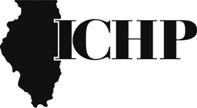 Illinois Council of Health-System Pharmacists
Illinois Council of Health-System Pharmacists
4055 North Perryville Road
Loves Park, IL 61111-8653
Phone: (815) 227-9292
Fax: (815) 227-9294
www.ichpnet.org
KeePosted
Official Newsjournal of the Illinois Council of Health-System Pharmacists
EDITOR
Jacob Gettig
ASSISTANT EDITOR
Jennifer Phillips
MANAGING EDITOR
Scott Meyers
ASSISTANT MANAGING EDITOR
Trish Wegner
DESIGN EDITOR
Amanda Wolff
ICHP Staff
EXECUTIVE VICE PRESIDENT
Scott Meyers
VICE PRESIDENT - PROFESSIONAL SERVICES
Trish Wegner
DIRECTOR OF OPERATIONS
Maggie Allen
INFORMATION SPECIALIST
Heidi Sunday
CUSTOMER SERVICE AND
PHARMACY TECH TOPICS™ SPECIALIST
Jo Ann Haley
ACCOUNTANT
Jan Mark
COMMUNICATIONS MANAGER
Amanda Wolff
LEGISLATIVE CONSULTANT
Jim Owen
ICHP Mission Statement
Advancing Excellence in the Practice of Pharmacy
ICHP Vision Statement
ICHP dedicates itself to achieving a vision of pharmacy practice where:
- Pharmacists are universally recognized as health care professionals and essential providers of health care services.
- Patients are aware of the training, skills, and abilities of a pharmacist and the fundamental role that pharmacists play in optimizing medication therapy.
- Formally educated, appropriately trained, and PTCB certified pharmacy technicians manage the medication distribution process with appropriate pharmacist oversight.
- Pharmacists improve patient care and medication safety through the development of effective public policies by interacting and collaborating with patients, other health care professionals and their respective professional societies, government agencies, employers and other concerned parties.
- Evidence-based practices are used to achieve safe and effective medication therapies.
- There are an adequate number of qualified pharmacy leaders within the pharmacy profession.
- Pharmacists take primary responsibility for educating pharmacy technicians, pharmacy students, pharmacist peers, other health professionals, and patients about appropriate medication use.
KeePosted Vision
As an integral publication of the Illinois Council of Health-System Pharmacists, the KeePosted newsjournal will reflect its mission and goals. In conjunction with those goals, KeePosted will provide timely information that meets the changing professional and personal needs of Illinois pharmacists and technicians, and maintain high publication standards.
KeePosted is an official publication of, and is copyrighted by, the Illinois Council of Health-System Pharmacists (ICHP). KeePosted is published 10 times a year. ICHP members received KeePosted as a member benefit. All articles published herein represent the opinions of the authors and do not reflect the policy of the ICHP or the authors’ institutions unless specified. Advertising inquiries can be directed to ICHP office at the address listed above. Image disclaimer: The image used in the Pharmacy Tech Topics advertisement is the property of © 2014 Thinkstock, a division of Getty Images.
Copyright © 2014, Illinois Council of Health-System Pharmacists. All rights reserved.
Features
Do You Know an Outstanding Mentor?
ICHP Seeks Nominees for the 2014 Amy Lodolce Mentorship Award
by Scott A. Meyers, Executive Vice President
Last year, ICHP created the Amy Lodolce Mentorship award as a memorial to Amy Lodolce, a University of Illinois at Chicago College of Pharmacy faculty member who touched the lives of pharmacy students, residents, and colleagues through her passion for teaching and the profession of pharmacy. Throughout her time at the college, Amy oversaw the training of four PGY2 drug information pharmacy residents, all of whom are currently drug information faculty at various institutions. She worked directly with numerous PGY1 residents and APPE students during their drug information rotations. She also served as a formal mentor to her student advisees, and was the advisor of the Phi Delta Chi pharmacy fraternity for many years. As the Assistant Director of the Drug Information Group, Amy served as an informal mentor to other faculty and was quick to help new faculty become oriented and situated. Amy approached being a leader and a mentor with an “open door” policy and would selflessly pause her work to address others’ needs. Students, residents, and faculty were impacted by her dedication as she worked tirelessly to provide them with quality learning opportunities. On August 31st, 2012, Amy passed away at the young age of 38 after a long illness, and this award was created in her memory. Amy’s dedication and generosity to the profession of pharmacy have positively shaped many pharmacists’ careers, and the memory of her will continue to do so.
Award Criteria:
- The individual nominated to receive this award must be an ICHP pharmacist, associate or technician member in good standing;
- The individual should be an exemplary preceptor, professor and/or mentor of students, residents, pharmacy technicians and/or new practitioners;
- The individual should be a positive role model for pharmacists, pharmacy students and/or pharmacy technicians;
- In order to be considered for the award, individuals must have been nominated using the approved nomination form below;
- More than one person may complete a nomination form for an individual.
Award Process:
- Each spring, a call for nominations will appear in KeePosted.
- The nomination form will be available on the ICHP website: www.ichpnet.org/awards
- Nominations may be received through June 30th of each year and should be sent to the ICHP office.
- The ICHP Executive Committee will review all nominations and select the finalists.
- The ICHP Board of Directors will select a recipient, should one be chosen.
- The award winner will be notified prior to the ICHP Annual Meeting to ensure attendance, and the award will be presented during the awards banquet.
- In the event that there are no suitable nominees for the award, an award will not be presented.
Award Nomination Instructions:
- To nominate an individual, you must complete and submit the approved nomination form. Click here to download.
- More than one person may complete a nomination form for an individual.
- Send nominations to Scott Meyers at ScottM@ichpnet.org or to the ICHP office by fax at 815-227-9294 or mail to 4055 N. Perryville Rd., Loves Park, IL 61111
Do You Know an Outstanding Illinois Pharmacist?
ICHP Pharmacist of the Year Nominees Sought
by Scott A. Meyers, Executive Vice President
ICHP is looking for the best of the best for the 2014 Pharmacist of the Year Award Recipient! You should recognize some of the previous years’ winners as they have been pharmacy leaders in Illinois and nationally: Stan Kent, Kevin Colgan, Andy Donnelly, Miriam Mobley-Smith, Mary Lee and so many more! One of the earliest recipients of Illinois Health-System Pharmacy’s highest award, Herb Carlin, served as President of both ASHP and APhA – a feat that has been done by only a very select few!
The ICHP Pharmacist of the Year recognizes a pharmacist who has worked in or around health-system pharmacy making substantial and sustained contributions to health-system practice or the profession in general. Below are the criteria for selection. Nominators should send a letter outlining the nominee’s accomplishments in detail to Ann Jankiewicz (2014 Selection Committee Chair) at Ann_M_Jankiewicz@rush.edu or Scott Meyers at scottm@ichpnet.org.
Selection Criteria
The Illinois Health-System Pharmacist of the Year Award is given annually, if a recipient is chosen, to an individual of high moral character, good citizenship and high professional ideals, who has made significant contributions affecting the practice of health-system pharmacy throughout the state. These contributions shall have been in the form of sustained exemplary service in health-system pharmacy, or, a single outstanding achievement, or, a combination of accomplishments benefiting health-system pharmacy, and through it, humanity and the public health. They may include accomplishments, achievements or outstanding performance in:
- health-system pharmacy practice,
- health-system pharmacy education,
- health-system pharmacy administration,
- pharmaceutical research or development related to health-system pharmacy,
- pharmacy organizational activity with a definite relationship to health-system pharmacy,
- scientific or professional pharmaceutical writing, e.g., noteworthy articles on pharmaceutical subjects with applicability to health-system pharmacy,
- pharmaceutical journalism related to health-system pharmacy,
- public and/or interprofessional relations activities benefiting health-system pharmacy,
- pharmaceutical law or legislation, professional regulations, standards of professional conduct or pharmacy law enforcement as related to health-system pharmacy practice.
Past Recipients of ICHP’s Pharmacist of the Year Award
1966 F. Regis Kenna *
1967 Louis Gdalman *
1968 C. Charles Lev *
1969 Edward Hartshorn
1970 Herbert Carlin *
1971 Sr. Mary Louise (Matthew) Degenhart
1972 Harland E. Lee
1973 Roger Klotz
1974 Ronald Turnbull
1976 John Lewis
1977 Raphael Jacobson *
1978 Terry Trudeau *
1979 Merrikay Oleen
1980 Sr. Mary Margaret Wright
Ernie Steinbaugh **
1981 Karen Nordstrom
1982 Mary Maranti *
1983 E. Clyde Buchanan
1984 David Vogel *
1985 William Wuller
1986 LeRoy Hayes *
1987 Max L. (Mick) Hunt
1988 Marcia Palmer
1989 Lee S. Simon
1990 Edna Dooley
1991 Scott A. Meyers
1992 Kenneth Witte
1993 Kevin Colgan
1994 Alan Weinstein
1995 Edward Donnelly
1996 Bruce Dickerhofe
1997 Steven E. Marx
1998 Janet L. Teeters
1999 James Dorociak
2000 Robert Hoy
2001 Jacqueline Kessler
2002 Andrew Donnelly
2003 Mary Ann Kliethermes
2004 Michael Novario
2005 Miriam Mobley-Smith
2006 Jan Keresztes
2007 Avery Spunt
2008 Stan Kent
2009 Michael Fotis
2010 Mary Lee
2011 Michael Weaver
2012 Patricia Wegner
2013 Ann Jankiewicz
* deceased
** awarded posthumously
It’s an Award for the Brightest of Our Rising Stars!
New Practitioner Leadership Award Nominees Sought
by Scott A. Meyers, Executive Vice President
ICHP has been blessed with a wealth of rising stars in the pharmacy world, and we’re looking for one of the brightest to receive the 2014 Illinois Council of Health-System Pharmacists' New Practitioner Leadership Award. The award recognizes an individual whose early accomplishments distinguish them as a future leader in the profession. The candidates should be individuals whose performance demonstrates a high degree of professionalism, leadership, and innovation. Nominations may be submitted to the ICHP office through Thursday, July 3, 2014, by an affiliate chapter or any two individual members of the ICHP. If a nominee is selected to receive the award, it will be presented at the Annual Meeting. Nominees should meet the following criteria:
- Earned his/her first pharmacy degree within the last 10 years;
- Encourage and support ICHP by membership, meeting attendance, and participation*;
- Demonstrate a consistently high level of professional achievement;
- Has developed, is working in or is working towards the development of an innovative practice in health-system pharmacy practice;
- Exhibit strong leadership qualities; and
- Possess a strong commitment to the advancement of the pharmacy profession.
* Membership in ICHP and volunteer activity within ICHP’s divisions, committees or board of directors are absolute requirements to receive this award.
To apply or nominate someone for this award, please forward a detailed letter of recommendation identifying the specific accomplishments of the nominee with respect to each criteria above to ICHP, 4055 N Perryville Road, Loves Park, IL 61111-8653, or email to scottm@ichpnet.org. Nominations for 2014 are due Thursday, July 3, 2014.
Selection of a recipient shall be by the ICHP Board of Directors by secret ballot. The nominator may be requested to provide additional information to the ICHP Board of Directors to facilitate discussion and selection.
Help us recognize one of tomorrow’s leaders and an outstanding new practitioner of today!
Call for Entries: 2014 Best Practice Award
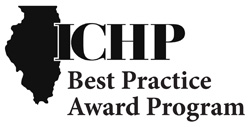
The objective of the Best Practice Award program is to encourage the development of innovative or creative pharmacy practice programs or innovative approaches to existing pharmacy practice challenges in health systems within the state of Illinois.
Applicants will be judged on their descriptions of programs and practices employed in their health system based on the following criteria:
- Innovativeness / originality
- Contribution to improving patient care
- Contribution to institution and pharmacy practice
- Scope of project
- Quality of submission
If you have any questions related to the program please contact Trish Wegner at trishw@ichpnet.org.
Past winners include:
2013
Nicole Rabs, Pharm.D., Sarah M. Wieczorkiewicz, Pharm.D., BCPS, Michael Costello, PhD, and Ina Zamfirova, BA
“Development of a Urinary-Specific Antibiogram for Gram Negative Isolates: Impact of Patient Risk Factors on Susceptibility”
2012
Kathryn Schiavo, Pharm.D.; George Carro RPh, MS, BCO; Abigail Harper, PharmD, BCOP; Betty Fang, PharmD; Palak Nanavati, PharmD
“Outpatient Oncology Treatment Center Approach to Enhancing Continuity of Care Related to Dispensing Oral Chemotherapeutic Agents”
2011
Fatima Ali, PharmD; Sarah Wieczorkiewicz, PharmD, BCPS; Jill Cwik, PharmD; Robert Citronberg, MD, FACP, FIDSA
“Procalcitonin-Guided Duration of Antimicrobial Therapy for the Treatment of Lower Respiratory Tract Infections”
|
Online entry form: http://www.ichpnet.org/professional_practice/best_practices/
Submission deadline: July 1, 2014
Eligibility
Applicants must be a member of ICHP practicing in a health system setting. More than one program can be submitted by a health system for consideration. Past submissions may be re-submitted if not previously given the award. Any new data should be included.
Instructions for preparing manuscript
Each entry for the Best Practice Award must include a manuscript prepared as a Word document, double-spaced using Times New Roman 12-pitch type. A header with the paper title and page number should appear on each page. The manuscript should not exceed 2000 words in length (not counting references), plus no more than a total of 6 supplemental graphics (tables, graphs, pictures, etc.) that are relevant to the program. Each picture, graph, figure, and table should be mentioned in the text and prepared as a separate document clearly labeled.
The manuscript should be organized as a descriptive report using the following headings:
- Introduction, Purpose, and Goals of the program
- Description of the program
- Experience with and outcomes of the program
- Discussion of innovative aspects of programs and achievement of goals
- Conclusion
Format
Submissions will only be accepted via online submission form. The manuscript will be forwarded to a pre-defined set of reviewers. Please do not include the names of the authors or affiliations in the manuscript to preserve anonymity.
All applicants will be notified of their status within three weeks of the submission deadline. Should your program be chosen as the winner:
- The program will be featured at the ICHP Annual Meeting. You will need to prepare a poster to present your program and/or give a verbal presentation. Guidelines will be sent to the winner.
- You may be asked to electronically submit your manuscript to the ICHP KeePosted for publishing.
- You will receive a complimentary registration to the ICHP Annual Meeting, recognition at the meeting and a monetary award distributed to your institution.
Non-winning submissions may also be considered for publication in the ICHP KeePosted, but your permission will be obtained beforehand.
|
Columns
 President's Message
President's Message
Is Your Practice Evidence-Based?
by Mike Fotis, ICHP President
I had the opportunity to attend an awards ceremony a few years back and found myself seated with a hospital administrator and several leaders from other healthcare fields during dinner. Usually when one is seated with five people you have never met, of course the other five end up being colleagues of some sort, known each other for years, and you get to be the odd man out during this happy reunion. As it turned out, the hospital administrator was a contemporary of mine, had graduated from pharmacy school at about the same time, and we ended up being a part of an interesting discussion. What a relief!
The administrator had not practiced pharmacy for decades and pointed out during our discussion that most likely he had forgotten almost everything taught in pharmacy school. He was a bit embarrassed by this. I remarked that perhaps having forgotten college material might not be as big a problem for him as he thought as most of the things we learned have been updated, and a lot of material we had learned is now flat out incorrect!
Of course I was being a wise guy during dinner conversation, but I think anyone who has been out of school for a dozen years or more has noticed that so much of the latest information tends to contradict earlier information we spent so much energy learning…which brings me to the question: Is your practice evidence-based?
How are you going to answer this question? My sense is that like me, most readers will state, “Well, of course MY practice is evidence-based. But I am not so sure about most of my colleagues!”
I think our goal as clinicians is to base our recommendations on findings that are reported in adequately powered randomized, double blinded studies using an active comparator that reported meaningful improvements in clinical outcomes in intact human beings. (Such studies are usually classified as Level 1 evidence.) We all agree with this statement of course, but sometimes the perfect study doesn’t exist (yet), and we need to make decisions about treatments that are based on weaker information. There is nothing wrong with using placebo comparisons or observational studies, or basing recommendations on expert opinion, anecdotes, or even on laboratory results…as long as a) it is the best information available; and b) the increased level of uncertainty is described and is transparent.
My point is that information from Level 1 evidence has a lesser degree of uncertainty and tends to hold true over time, and while we may need to modify our views a bit in the future, the basic structure of our understanding often does not change. On the other hand, information based on animal models, human cell cultures, laboratory analyses, observational studies and even expert opinions may often be corrected and substantially revised when later examined in a Level 1 type study.
Most speakers and authors go beyond merely listing a reference and point out when information was not measured in adequately powered randomized, double blinded studies using an active comparator that reported meaningful improvements in clinical outcomes in intact human beings. This step is an easy one: For example, “recent data from an animal model of kidney function has shed new light on the mechanism of action of drug X.” Or perhaps point out that an “antimicrobial dosing strategy is based on microbiological findings plus population pharmacokinetic data, but of course still needs to be adequately tested in humans.”
Most of us provide a necessary caveat to our audience most of the time. I would like to see us as pharmacists become more consistent at reporting the limitations of our recommendations. Whether the audience is our students, residents, or colleagues and whether the venue is KeePosted, the ICHP Annual Meeting, or the Spring or Regional Meetings, we should be careful to specifically point out whenever information is based on less than Level 1 evidence. By pointing out the limitations and inherent uncertainty of your analysis, you will let your audience know there is a good chance that someday in the near future your conclusion will need to be revised. And of course when instead recommendations are based on Level 1 evidence, it’s a good idea to plan on remembering this data into the future!
Please let me know your opinion on this topic. I plan to submit this recommendation to the Division of Educational Affairs for consideration.
 Directly Speaking
Directly Speaking
It’s been a great trip so far!
by Scott A. Meyers, Executive Vice President
An email in jest from a good friend took me down a rabbit hole and got me thinking about what my life would have been without ICHP. It’s been 22 years in May, since I became ICHP’s first Executive Director and now Executive Vice President. Twenty-two years is no special milestone to celebrate but whenever May 10th rolls around, I tend to reflect a little. And because I’ve been writing ten “Directly Speaking” columns a year for now 22 years, sometimes I get a little blocked for a topic. So my reflections have helped break this month’s block for me and you!
Rather than talk about all the specifics of my 22 years (because I really want you all to continue reading this column after this issue), I’ll see if I can use the space to demonstrate how ICHP can support, alter or impact your lives. And I certainly don’t intend to encourage you all to prepare to take over my job in the future, although I would say that any pharmacist who has an interest in this type of position should consider what it might take to prepare for something like this. I’m guessing there might be one or two of you out there.
ICHP gives any member who seeks it, the opportunity to learn at a variety of levels. Of course there’s always been continuing pharmacy education (CPE). In 1977 when I first joined ICHP, the most available CPE opportunities were the pharmaceutical industry sponsored educational events. Most included a dinner at a nice restaurant, and I fondly think of those days as the “Supper Club Days”. Those have been gone now for many years and while I think everyone from my generation misses those wonderful meals, any of us that are truly honest also will say that the education was suspect if not completely biased in many cases. Today, ICHP offers the Champion Webinars every other month. These live and online programs provide 30 minutes of CPE credit on the hot topics of the day, presented by experts in the field, and you don’t even have to leave work! Granted, there are no meals but with a sack lunch or snack of your choice, you can always pretend you’re enjoying fine dining while you do obtain great CPE credit!
But these Champion Webinars, the “Supper Club Meetings” of today, offer you another opportunity. Once the program ends, you can discuss with colleagues what you believe the value or impact of the program might have at your institution. It’s a chance to get to know the practice side of your colleagues a little better and hopefully improve care for your patients.
In 1977, I didn’t get involved with ICHP’s statewide meeting, the Annual Meeting, but after a few years, I became an officer of the Rock Valley Society of Hospital Pharmacists and found myself attending the Annual Meeting as a Rock Valley delegate to the House. That single step of becoming an affiliate officer and a delegate to ICHP’s House opened two doors. The networking I had come to enjoy at the local CPE programs expanded immediately when I travelled to the statewide meeting. I met pharmacists (sorry technicians and students rarely attended our meetings back then) from all over the State. I remember sitting at a back table at my first Annual Meeting banquet in 1982. That luncheon featured William E. Smith, the 1982 Whitney Award Recipient, and as I sat and ate my meal, listening to Bill present, I thought to myself, “Someday I want to know the people at the head table!” Little did I know that eventually, I would be the one that decides who gets to sit at the head table, or even if there is a head table! Long story short, I know, “too late”, the mere fact that I was able to venture forth from Rockford to attend that meeting in Rosemont, opened up another level of networking and friendships that I never really thought I would have. Perhaps society has progressed enough these days with technology that individuals can network without leaving home, but I still find that the face-to-face opportunities create stronger relationships that often lead to friendships and a willingness to share whenever and wherever help is needed to improve practice.
In 1985, Illinois sought to join most other States in requiring CE for pharmacists’ relicensure. Being an altruist (at the time) and knowing what kind of CPE programming was currently available, I convinced the Rock Valley Society to take a position opposing mandatory continuing education for pharmacist relicensure. Our delegation took that position to the ICHP House of Delegates, and with the oratory help of Past President Harland Lee, the House narrowly approved a position opposing mandatory CE. This was a great accomplishment; however, ICHP did not have a lobbyist in Springfield, and there was already a bill rolling through the General Assembly. A few weeks later, as a member of the ICHP Board of Directors, I personally took the fight to Springfield with an on the road before dawn drive, not knowing what to do or with whom to speak. IPhA fully supported the bill, and their lobbyist was absolutely no help. Eventually, I found the clerk of the Senate Professional Regulations Committee, completed a witness slip and waited to testify before the committee. The bill was called, and the witness slips were read, without calling a single witness, the bill was passed out of Committee and my day seemed to be a waste. I signaled the clerk and said I wanted to speak. The Chair allowed me to provide a couple of minutes of why CE would not make bad pharmacists any better, and then he moved to another bill. At that point, I vowed to learn more and advocate more for pharmacy in the future. I don’t think I envisioned becoming the registered lobbyist I am today.
Again a long story, but back then we had no “Legislative Day”. We had no “Leg Day 101”. We didn’t have a lobbyist on contract let alone the two we have today. (I’m counting myself and Jim Owen, the guy that does the real work for us in Springfield!). ICHP has a strong Government Affairs Divisions led by Frank Kokaisl and members from all practice settings. We are in a much better position today with both the General Assembly, the Department of Financial and Professional Regulation and the Board of Pharmacy than we have ever been. If a member wants to become politically active either as an advocate or a candidate, ICHP has the resources to provide training and guidance through the process. It would be fun to help a fellow pharmacist break back into the General Assembly!
Finally, back in the late 1980s, I was invited to attend ICHP’s first Leadership Retreat. It took place at the Marriott Lincolnshire, not necessarily what I think of as a retreat center, but it brought together the Board of Directors and select past presidents to plan ICHP’s future. During that retreat and subsequent retreats, leadership training was incorporated into the agenda and many of my early lessons in leadership came from those retreats. Today, ICHP conducts our Leadership Retreat annually in November. It begins on a Friday at lunch and ends Saturday afternoon around 3:00 PM. We provide leadership training at every retreat. Last year, the book Decisive written by Chip and Dan Heath was reviewed. The book described how most individuals make decisions and how anyone can use the book’s principles to make better decisions in the future. We now invite the Board, past presidents, and our most active volunteers. ICHP covers all the meeting costs including food and lodging. We no longer use properties like the Marriott Lincolnshire but focus more on rural retreat centers throughout the state.
These are just some of the memories that were rekindled this morning. And once I reflected, I saw how each of you can use what ICHP offers to improve your practice, build your network, and further your careers. I doubt anyone would choose to take the path I took but each you may have a specific path that you could use a little guidance moving down. ICHP’s active volunteers, members and staff can help you on your journey if you merely ask. The organization has a lot to give and a lot to gain by the involvement of each and every one of our members. As you can see for me, “It’s been a great trip, so far!”
Educational Affairs
Is Using the Number of Patient Medications the Best Strategy for Identifying Patients at Risk for Hospital Re-admission Within 30 Days?
by Ed Rainville, MS Pharm, Clinical Pharmacy Manager, OSF Saint Francis Medical Center
Although previous studies have shown an association between the number of medications patients take and medication errors and discrepancies,1,2 a recent report from the University of Kansas Hospital (UKH) has attempted to determine the number of medications most beneficial in identifying patients with high rate of 30-day re-admissions.3 A common strategy is to use between 5 and 10 medications in identifying patients at risk for non-adherence with their medication regimen. Since a significant majority of hospitalized patients take 5 or more medications, hospitals may choose a higher cutoff of medications to avoid the significant workload this would pose with intervention strategies. Therefore, it is desirable to determine the number of medications sensitive enough to identify most patients at risk for non-adherence.
In the UKH study, patients admitted to a 36-bed medical and surgical unit were flagged to receive counseling by a pharmacist if they had ten or more maintenance medications and as-needed narcotics or if they were on a ‘problem medication’ (e.g., anticoagulants, insulin, aspirin plus clopidogrel, digoxin, or narcotics). UKH was a participant in Project BOOST4 for this study and the ‘problem medications’ were ones identified by this initiative. The number of patients on 10 or more medications without a problem medication was not reported. However, more than 70% of patients in the pharmacist intervention group met both criteria and therefore received counseling and assistance with their medications. Over the 4 month study period, 16.8% of 537 patients who received pharmacist assistance were re-admitted within 30 days of discharge as compared to 26% of 192 patients who received usual care. What is particularly interesting is the reported correlation between the number of medications and the 30-day readmission rate. Both groups showed a consistent increase in readmissions; from 12.2% for patients on less than 10 medications to 36.4% for patients on more than 30 medications. Study limitations included low number of participants in the control group, lack of randomization and patient location limited to one patient care unit.
Although this study shows a distinct correlation between the number of medications and risk for re-hospitalization, there are many other factors that influence medication adherence, such as health literacy, regimen complexity, side effects, financial situation of the patient, and patient understanding.5 At least two reports provide a ‘medication complexity index’ calculation for patients taking antiretrovirals6 and another for patients with hypertension and/or diabetes.7 So is the number of patient's medications the most efficient strategy for identifying those who are non-adherent and therefore at greater risk for hospital readmission within 30 days after discharge?
OSF Saint Francis Medical Center, a 616 bed, tertiary care facility located in Peoria, Illinois, recently initiated the Best Care program, which incorporates an admission screening tool in an effort to decrease hospital re-admissions. To assess medication adherence, it was decided to ask all patients the following questions upon admission:
- How often are you unable to obtain your medications?
- How often do you miss taking your medications?
The questions have response choices of never, rarely, occasionally and frequently. If the patient’s response is occasionally or frequently, a Care Manager and/or Social Worker intervene depending on the identifiable cause(s). These providers can assist with insurance coverage, home care and transportation problems. Pharmacists assist with problem medications, such as warfarin education, or getting prescriptions filled prior to discharge. Responses from approximately 14,000 patients to these questions over a 6-month period showed the following:
How often are you unable to obtain medications?
|
Cases |
% of Total |
| Never |
10,855 |
80% |
| Rarely |
1,770 |
13% |
| Occasionally |
579 |
4% |
| Frequently |
361 |
3% |
| Total |
13,565 |
|
How often do you miss taking your medication?
|
Cases |
% of Total |
| Never |
8,751 |
65% |
| Rarely |
3,397 |
25% |
| Occasionally |
1,000 |
7% |
| Frequently |
442 |
3% |
| Total |
13,590 |
|
Although response accuracy was not confirmed, the 35% of patients recorded as missing some medication doses rarely, occasionally, or frequently is within the range of medication non-adherence reported in the literature.8 With respect to potential workload of providing additional medication assistance, the number of patients identified by asking these two questions is well below the 73.7% of patients in the UKH study. Unfortunately, an analysis of the effect on 30-day re-admissions using this screening tool was not done and would be difficult to assess since medication adherence is only one part of the admission evaluation.
In conclusion, based on the literature, it appears that providing hospitalized patient counseling and intervention based on the number of medications that a patient takes and the use of problem medications can reduce 30-day hospital re-admissions. However, this measure may not be sensitive enough to make efficient use of the healthcare provider’s time. Asking patients if they are non-adherent may help refine identification of people with the greatest need for assistance, although further study of this screening tool is needed.
References:
- Makaryus AN, Friedman ED. Patients understanding of their treatment plans and diagnosis at discharge. Mayo Clin Proc. 2005;80:991-4.
- Forster AJ, Murff HJ, Peterson JF, Gandhi TK, Bates DW. The incidence and severity of adverse events affecting patients after discharge from the hospital. Ann Intern Med 2003;138:161-7.
- Pal A, Babbott S, Wilkinson ST. Can the targeted use of a discharge pharmacist significantly decrease 30-day readmissions? Hosp Pharm 2013; 48:380-8.
- Society of Hospital Medicine. Project better outcomes for older adults through safe transitions. https://www.hospitalmedicine.org/ResourceRoomRedesign/RR_CareTransitions/CT_Home.cfm July 2011.
- Ingersoll KS, Cohen J. The impact of medication regimen factors on adherence to chronic treatment: a review of literature. J Behav Med 2008;31:213-224.
- Martin S, Wolters PL, Calabrese SK, Toledo-Tamula MA, Wood LV, Roby G, Elliott-DeSorbo DK. The antiretroviral regimen complexity index. A novel method of quantifying regimen complexity. J Acquir Immune Defic Syndr 2007;45:535-544.Jencks SF, Williams MV, Coleman EA. Rehospitalizations among patients in Medicare fee-for-service program. N Engl J Med. 2009; 360:1418-28.
- Rettig SM, Wood Y, Hirsch JD. Medication regimen complexity in patients with uncontrolled hypertension and/or diabetes. J Am Pharm Assoc 2013;53:427-31.
- Fischer Ma, Stedman MR, Lii J, Vogeli C, Shrank WH, Brookhart MA, Weissman JS. Primary medication non-adherence: Analysis of 195,930 electronic prescriptions. J Gen Intern Med 2010; 25:284-90.
Leadership Profile
Ana B. Fernandez, CPhT
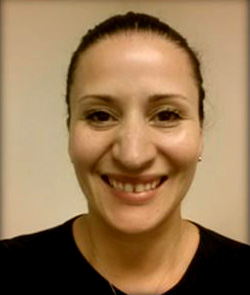 Where did you grow up and go to school?
Where did you grow up and go to school? I was born and raised in Chicago and attended Harold Washington College where I received my Associate in Science in 2009.
Trace your work history: where have you trained / worked/ any special accomplishments?
I have worked in the pharmacy department at Northwestern Memorial Hospital since 1995. I started in the pharmacy billing department and was later asked to work as a pharmacy technician. I accepted and I am glad I did. During this time, I worked in many areas such as investigational pharmacy where I worked closely with research studies. I’ve worked in both inpatient and outpatient oncology where I learned how to prepare 24 hour chemotherapy batches including infusions, intrathecal, IM, topical, and oral compound cytotoxic agents. I also worked in the neonatal pharmacy where I learned to dilute intravenous solutions for neonatal and pediatric patient populations. I worked with ADC’s (Omnicell). I have been able to work and learn every area here in the pharmacy department at Northwestern which has helped with my current position as a practice coordinator.
Describe your current area of practice and practice setting.
I was given the opportunity to take on the role of Practice Coordinator. Being the first pharmacy technician to take on this important role here at Northwestern, I feel that it is my duty to elevate the role of pharmacy technicians to the highest level possible. Being able to be part of pharmacy and its evolvement here at Northwestern has been an amazing experience. I work closely with pharmacists and technicians to improve or maintain workflow in each area. We have been working together and succeeding at getting many technicians certified and more involved in projects. I work closely alongside four other Practice Coordinators who are pharmacists. I was able to be part of Tech Check Tech, which we rolled out in September of 2013.
What initially motivated you to get involved, and what benefits do you see in being active in a professional association such as ICHP?
Learning that there were associations that pharmacy technicians can be part of, I wanted to jump at this opportunity to be able to learn as much as possible from others and bring back that knowledge to Northwestern. Being part of ICHP gives me the opportunity to meet other people with the same interests as me and to discuss ideas and ways to improve pharmacy as a whole.
What advice would you give to a new technician eager to become more involved within ICHP?
Become involved as soon as possible and take advantage of all the opportunity and guidance that ICHP has to offer!
What is your vision for pharmacy in the future? Or what would you like to see accomplished within pharmacy?
I would love to see more technicians work with pharmacists and be directly involved with patient care in both the inpatient and outpatient settings.
What three adjectives would people use to best describe you?
Caring, energetic, and passionate.
Do you have any special interests or hobbies outside of pharmacy/work/school?
I started running back in 2011 to stay healthy and I have become addicted. I have run 6 half marathons and ran my first full marathon last year and will be running my second this year. I never thought I would be able to run more than a block but with training, it became possible.
What is the most interesting/unique fact about yourself that few people know?
I guess a unique fact about me that not many people know is that I used to be a Latin dance instructor. I stopped teaching back in 2001.
Board of Pharmacy Update
Highlights from the May Meeting
by Scott A. Meyers, Executive Vice President
The May 13th Board of Pharmacy Meeting was held at the James R. Thompson Center in Chicago. These are the highlights of that meeting.
Pharmacy Practice Act Rules – The new draft rules for the Pharmacy Practice Act are expected to be published in the Illinois Register on Friday May 16th. This will initiate a 45-day public comment period. ICHP and other pharmacy organizations have been involved in the development of these rules, so we are not anticipating any significant issues with them. ICHP will provide written comments to the Department before the 45-day comment period ends.
Controlled Substance Act Rules – A proposed draft of the Illinois Controlled Substance Act Rules was published in the March 7th Illinois Register. The 45-day comment period ended on April 20th, and ICHP provided comments related to those proposed changes. The Department received a variety of comments and is in the process of evaluating them all and incorporating those that are considered appropriate. A final draft is expected to be sent to the Joint Committee on Administrative Rules within the next 30 days.
Federal Compounding Regulation – Department staff attended a conference that discussed the regulation of outsourcing facilities hosted by the FDA in April. The conference did not provide much guidance for states that wish to establish their own regulations. However, the IDFPR staff did indicate that facilities that consider themselves “outsourcing facilities” should obtain a Wholesale Distributor license in Illinois if they provide product to pharmacies within the State. At this time, the Department has determined that any compounding provided to a physician office or clinic must be patient specific with a prescription or be compounded in anticipation of a patient specific prescription. This continues to pose a serious issue for physician offices and clinics that use products that are compounded in multidose containers whether sterile or non-sterile.
Illinois Legislative Update – Garth Reynolds, IPhA Executive Director, provided this meeting’s legislative update. Mr. Reynolds highlighted many of the bills ICHP is currently monitoring, and those may be found in this issue’s GAS From Springfield column.
Visitor Question and Comment Section – The Board entertained questions and comments from the visitors present at the meeting. One visitor raised a concern with a proposed Chapter 800 by USP. The Chapter is being written to provide standards for handling hazardous materials. The first draft appears to have substantial requirements for the safe handling of hazardous drugs that would create a prohibitive environment for dispensing medications such as methotrexate, progesterone or any oral or injectable chemotherapy agents. Board members recommended working with national pharmacy organizations to address these concerns.
Next Board of Pharmacy Meeting – Is scheduled for Tuesday, July 8th at 10:30 AM on the 9th floor of the James R. Thompson Center in downtown Chicago. Pharmacists, pharmacy students and pharmacy technicians are welcome to attend the open portion of the meeting.
ICHPeople
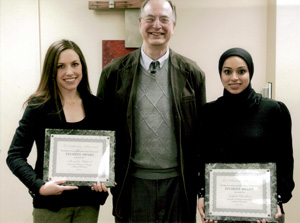 Congratulations to Alexandra Habanek and Nadiyah Chaudhary on winning student awards at University of Illinois College of Pharmacy! (Pictured at right with ICHP President, Mike Fotis.)
Congratulations to Alexandra Habanek and Nadiyah Chaudhary on winning student awards at University of Illinois College of Pharmacy! (Pictured at right with ICHP President, Mike Fotis.)
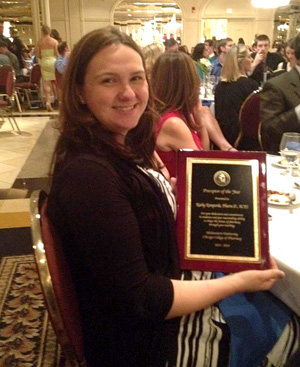 Congratulations to these ICHP members on winning awards at Midwestern University Chicago College of Pharmacy!
Congratulations to these ICHP members on winning awards at Midwestern University Chicago College of Pharmacy!
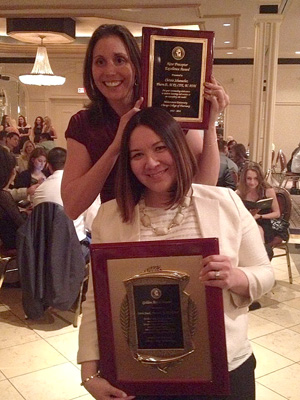 Kathy Komperda received the Preceptor of the Year Award.
Kathy Komperda received the Preceptor of the Year Award.
Carrie Sincak received the Golden Apple Award.
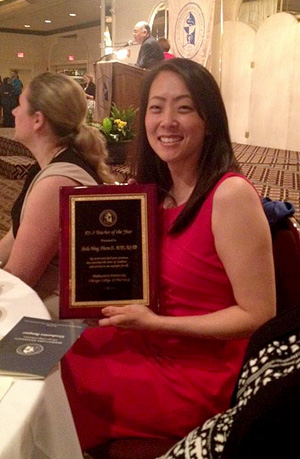 Christie Schumacher received the New Preceptor Excellence Award.
Christie Schumacher received the New Preceptor Excellence Award.
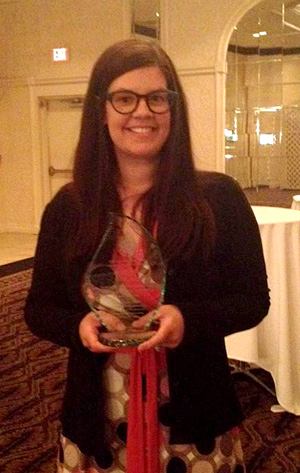 Sheila Wang received the PS3 Teacher of the Year Award.
Sheila Wang received the PS3 Teacher of the Year Award.
Sarah Wieczorkiewicz was named Alumnus of the Year.
The GAS From Springfield
For the General Assembly It’s May Madness!
by Jim Owen and Scott Meyers
The month of May brings a flurry of activity and a rush to the finish-line for the Illinois General Assembly. Finishing all their business by midnight on May 31st is always their ultimate goal, even if they accomplish little when they get there. You see, if they do not finish their work at that time, the General Assembly goes into “overtime”, just like the Blackhawks have done so many times this year, and just like in hockey, the rules change dramatically! In hockey, the overtime is sudden death. In the General Assembly, the end is not as fast and easy as the first goal scored, but rather the simple majority required to pass legislation becomes a super majority of 60% of those voting. There is no overtime pay or playoff bonuses, simply per diems to help with travel and housing, and it is much tougher to get things done.
So as May winds down, we have been watching several bills and lobbying on your behalf on a few others. We hope that we don’t see movement on the biosimilar bill, and the sponsor continues to promise that is the case. We have worked to find a compromise on SB2941, which would have hidden Class 3 and 4 felony convictions for possession of marijuana with intent to distribute from any potential background checks, and finally, we are still waiting to see language that will raise pharmacy-related licensing fees in the future.
We encourage you to review the current bill list provided below and take any opportunity to speak with your legislators about any of these issues between now and the end of the month. We’ll let you know in next month’s edition what we need you to communicate to your legislators during the summer, when they are out locally in full force raising campaign funds, marching in parades, kissing babies and doing what they can to impress the voters.
As we mentioned above, anytime is a great time to meet with your legislators when they are home on the weekends or after this year’s spring session has ended. Many fundraising events are already occurring across Illinois and many are not the $1,000 a plate, high profile dinners we hear about in the news. Many events ask for contributions of $40 to $60 per person to meet and greet the candidates, grab a beverage and a bite to eat and maybe run into some friends or health care colleagues. You know your physician and nurse practitioner friends really understand how to play the game…isn’t it time you learned? And if, in your opinion (and we sincerely value that), the candidates in your district aren’t worth supporting, then send some campaign contributions to the ICHP Pharmacy Action Fund to support ones that are!
Right now the ICHP Pharmacy Action Fund $1K Raffle is in progress. Your contributions sent to the ICHP office between now and the ICHP Annual Meeting in September will earn you raffle tickets that could win you the grand prize! The drawing for one winner of the $1,000 prize will be drawn on Saturday morning, September 13th at the ICHP Annual Meeting in Oakbrook Terrace. But no worries, you need not be present to win, even though missing this premiere educational event would be a shame! Tickets may be purchased at the following prices:
Pay:
$5 1 Ticket
$25 6 Tickets
$50 15 Tickets
$100 45 Tickets
You can’t win if you don’t play! And Pharmacy can’t win in Springfield unless we all roll up our sleeves and make good contributions on its behalf also! To order your tickets, go online to obtain an order form that may be mailed or faxed at 815-227-9294, or call the ICHP office at 815-227-9292 with a credit card. Please do not email order forms to the office. Credit card information in scanned and emailed format is not safe.
Here are the bills we have been watching for you and their status at the time this edition was written. Some of them are nearly dead, but again, we are never sure until the General Assembly adjourns.
| Bill No. |
Sponsor |
Summary |
Status |
Position |
| SB1454 |
Delgado, D-Chicago |
Amends the Wholesale Drug Distribution Licensing Act. Provides that notwithstanding any other provision of law, a distributor licensed and regulated by the Department of Financial and Professional Regulation, and registered and regulated by the United States Drug Enforcement Administration, shall be exempt from the storage, reporting, ordering, record keeping and physical security control requirements for Schedule II controlled substances with regard to any material, compound, mixture or preparation containing Hydrocodone. These Controlled Substances shall be subject to the same requirements as those imposed for Schedule III controlled substances. Amends the Illinois Controlled Substances Act. Defines Prescription Monitoring Program Advisory Committee and electronic health record. Provides that Dihydrocodeinone (Hydrocodone) with one or more active, non-narcotic ingredients in regional therapeutic amounts is a Schedule III controlled substance, subject to the requirements for prescribing of Schedule III controlled substances with the exception that any prescription must be limited to no more than a 30-day supply with any continuation requiring a new prescription. Provides that prescribers may issue multiple prescriptions (3 sequential 30-day supplies) for Dihydrocodeinone (Hydrocodone), authorizing up to a 90-day supply. Provides that by January 1, 2018, all Electronic Health Records Systems should interface with the Prescription Monitoring Program application program interface to insure that all providers have access to specific patient records as they are treating the patient. Makes other changes. |
Passed Senate as Amended Rules Committee in the House |
Neutral |
| SB1934 |
Munoz, D-Chicago |
Amends the Pharmacy Practice Act. Provides that a pharmacist may substitute a prescription biosimilar product for a prescribed biological product under certain circumstances. Provides that the Board shall adopt rules for compliance with these provisions. |
Assignments Committee |
Oppose |
| SB2585 |
Kotowski, D- Park Ridge |
Amends the Illinois Public Aid Code and the Illinois Insurance Code. Requires the Department of Healthcare and Family Services and the Department of Insurance to jointly develop a uniform prior authorization form for prescription drug benefits on or before July 1, 2014. Provides that on and after January 1, 2015, or 6 months after the form is developed, whichever is later, every prescribing provider may use that uniform prior authorization form to request prior authorization for coverage of prescription drug benefits and every health care service plan shall accept that form as sufficient to request prior authorization for prescription drug benefits. Provides that on and after January 1, 2015, a health insurer that provides prescription drug benefits shall utilize and accept the prior authorization form when requiring prior authorization for prescription drug benefits; and that if a health care service plan fails to utilize or accept the prior authorization form, or fails to respond within 2 business days upon receipt of a completed prior authorization request from a prescribing provider, the prior authorization request shall be deemed to have been granted. Exempts certain providers. Sets forth certain criteria for the prior authorization form. Provides that "prescribing provider" includes a provider authorized to write a prescription as described in the Pharmacy Practice Act. Effective January 1, 2014. |
Assignments Committee |
Oppose |
| SB2636 |
Martinez, D-Chicago |
Senate Amendment 1 Replaces everything after the enacting clause with the bill as introduced with the following change. Replaces references to myoclonic-astatic epilepsy with those of seizures, including those characteristic of epilepsy. |
Passed in the Senate Placed on 2nd reading in the House |
Neutral |
| SB2674 |
Harmon, D- Oak Park |
Amends the State Finance Act. Adds the Poison Response Fund. Amends the Wireless Emergency Telephone Safety Act. Provides that human poison control centers constitute an enhancement to 9-1-1 services pursuant to federal law. Provides that for surcharges collected and remitted on or after July 1, 2013, $0.1275 per surcharge collected shall be deposited into the Wireless Carrier Reimbursement Fund on the last day of each month, $0.5825 per surcharge collected shall be deposited into the Wireless Service Emergency Fund, $0.02 per surcharge shall be deposited in the Poison Response Fund, and $0.01 per surcharge collected may be disbursed to the Illinois Commerce Commission for administrative costs. Requires the Auditor General to conduct an annual audit of the Poison Response Fund. Permits the Commission to require an annual report of income and expenditures from each human poison control center. Extends the date of repeal of the Act to July 1, 2018 (currently July 1, 2013). Creates the Poison Response Fund. Amends the Public Utilities Act. Extends the repeal of certain Sections relating to 9-1-1 system providers until July 1, 2016 (currently July 1, 2015). Effective immediately. |
Passed in the Senate Rules Committee in the House |
Support |
| SB2941 |
Raoul, D-Chicago |
Amends the Criminal Identification Act. Authorizes the court to seal Class 4 felony convictions for possession with intent to manufacture or deliver cannabis without the defendant being required to successfully complete qualified probation under the Act. Authorizes the court to seal Class 3 felony convictions for possession with intent to manufacture or deliver cannabis without the defendant being required to obtain an authorization for sealing from the Prisoner Review Board. This would blind potential employers who are required to do a background check on potential hires. Effective immediately. Amendments pending. |
Passed the Senate Judiciary Committee in the House |
Oppose (may become neutral if amendments are accepted.) |
| SB3109 |
McGuire, D-Crest Hill |
Amends the Illinois Optometric Practice Act of 1987. Permits a licensed optometrist to prescribe Dihydrocodeinone (Hydrocodone) with one or more active, non-narcotic ingredients only in a quantity sufficient to provide treatment for up to 72 hours, and only if such formulations are reclassified as Schedule II by the U.S. Food and Drug Administration. |
Passed in the Senate On 3rd Reading in the House |
Oppose |
| SB3277 |
Althoff, R-McHenry |
Amends the Pharmacy Practice Act. Adds the administration of the Meningococcal vaccine to patients 10 through 13 years of age to the definition of "practice of pharmacy". |
Assignments Committee |
Oppose Senate Amendment 1 |
| SB3502 |
Koehler, D- Peoria |
Amends the Illinois Controlled Substances Act. Provides that substances containing ephedrine or pseudoephedrine, their salts or optical isomers, or salts of optical isomers, are Schedule III controlled substances and require a prescription. |
Assignments Committee |
Oppose |
| HB3638 |
Fine, D- Glenview |
Amends the Illinois Public Aid Code and the Illinois Insurance Code. Requires the Department of Healthcare and Family Services and the Department of Insurance to jointly develop a uniform prior authorization form for prescription drug benefits on or before July 1, 2014. Provides that on and after January 1, 2015, or 6 months after the form is developed, whichever is later, every prescribing provider may use that uniform prior authorization form to request prior authorization for coverage of prescription drug benefits and every health care service plan shall accept that form as sufficient to request prior authorization for prescription drug benefits. Provides that on and after January 1, 2015, a health insurer that provides prescription drug benefits shall utilize and accept the prior authorization form when requiring prior authorization for prescription drug benefits; and that if a health care service plan fails to utilize or accept the prior authorization form, or fails to respond within 2 business days upon receipt of a completed prior authorization request from a prescribing provider, the prior authorization request shall be deemed to have been granted. Exempts certain providers. Sets forth certain criteria for the prior authorization form. Provides that "prescribing provider" includes a provider authorized to write a prescription as described in the Pharmacy Practice Act. Effective January 1, 2014. |
Passed in the House in Insurance Committee in Senate |
Neutral |
| HB4230 |
Lilly, D-Chicago |
Amends the State Finance Act. Adds the Poison Response Fund. Amends the Wireless Emergency Telephone Safety Act. Provides that human poison control centers constitute an enhancement to 9-1-1 services pursuant to federal law. Provides that for surcharges collected and remitted on or after July 1, 2013, $0.1275 per surcharge collected shall be deposited into the Wireless Carrier Reimbursement Fund on the last day of each month, $0.5825 per surcharge collected shall be deposited into the Wireless Service Emergency Fund, $0.02 per surcharge shall be deposited in the Poison Response Fund, and $0.01 per surcharge collected may be disbursed to the Illinois Commerce Commission for administrative costs. Requires the Auditor General to conduct an annual audit of the Poison Response Fund. Permits the Commission to require an annual report of income and expenditures from each human poison control center. Extends the date of repeal of the Act to July 1, 2018 (currently July 1, 2013). Creates the Poison Response Fund. Amends the Public Utilities Act. Extends the repeal of certain Sections relating to 9-1-1 system providers until July 1, 2016 (currently July 1, 2015). Effective immediately. |
On 2nd Reading |
Support |
| HB4484 |
Reboletti, R-Addison |
Creates the Patient Transitions and Continuity of Care Act. Provides that whenever a patient is transferred from a hospital, nursing home, or assisted living facility the transferring hospital, nursing home, or assisted living facility shall provide the receiving hospital, nursing home, or assisted living facility with a form that lists certain specified information about the patient. Provides that the Illinois Department of Public Health shall develop and publish the form that is to be used by the transferring hospital, nursing home, or assisted living facility. Effective immediately. |
Rules Committee |
Support |
| HB4575 |
Lilly, D-Chicago |
Appropriates $1,331,100 from the General Revenue Fund to the Department of Public Health from the General Revenue Fund for grants to the Illinois Poison Center. Effective July 1, 2014. |
Appropriations – Human Services Committee |
Support |
| HB4580 |
Lilly, D-Chicago |
Amends the Health Care Worker Background Check Act. Provides that the prohibition against a health care employer or long-term care facility hiring, employing, or retaining an individual in a position with duties involving direct care for clients, patients, or residents, or duties that involve or may involve contact with long-term care facility residents or access to the living quarters or the financial, medical, or personal records of residents, on account of the individual's conviction of committing or attempting to commit one or more of certain specified offenses shall be for a period of (i) 2 years following the date of conviction in the case of a conviction for a misdemeanor and (ii) 5 years following the date of conviction in the case of a conviction for a felony. Effective immediately |
2nd Reading in the House |
Neutral |
| HB5631 |
Gabel, D-Evanston |
Amends the Pharmacy Practice Act. Defines "bleeding disorder", "blood clotting product", and "established patient". Establishes certain requirements, standards of care, and business practices that pharmacies and pharmacists shall comply with when dispensing blood clotting products. |
Re-assigned to Rules Committee |
Oppose |
| HB5924 |
Zalewski, D-Riverside |
Amends the Illinois Vehicle Code. Provides that a person shall not drive or be in actual physical control of any vehicle within this State while there is any amount of a drug, substance, or compound in the person's breath, blood, or urine resulting from the use or consumption of a controlled substance listed in the Illinois Controlled Substances Act in excess of the prescribed amount in the person's prescription for the controlled substance. |
Re-assigned to Rules Committee |
Oppose |
| HB5987 |
Phelps, D-Harrisburg |
Creates the Audits of Pharmacy Benefits Act. Imposes a number of requirements on audits of pharmacy services conducted pursuant to a contract entered into by the pharmacy and the auditing entity on behalf of a health carrier or a pharmacy benefits manager. Requires the entity conducting a pharmacy audit to deliver a preliminary audit report to the pharmacy and to give the pharmacy an opportunity to respond to the report prior to issuing a final audit report. Provides that the entity is also required to implement a process for appealing the findings of the final audit report, and further provides that if either party is unsatisfied with the appeal, that party may seek relief under the terms of the contract. Establishes a number of requirements that the auditing entity must follow when calculating the amounts and penalties that are to be recovered from the pharmacy based on the audit report, and prohibits the entity from receiving payment on any basis tied to the amount claimed or recovered from the pharmacy. Effective immediately. |
Rules Committee |
Oppose in current form |
If you have questions about these or any other bills, please contact us via email (jownenconsulting@aol.com or scottm@ichpnet.org), and we will do our best to help you better understand and advocate for pharmacy.
New Practitioners Network
ICHP New Practitioners Network Serves Brunch at the Ronald McDonald House
by Erika Hellenbart, PharmD, BCPS and Emma Carroll P3 Student, University of Illinois at Chicago
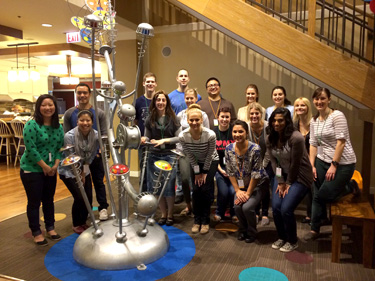 The Ronald McDonald House in Chicago opened its doors in June of 2012 after moving from its former location in Lincoln Park, shortly after the opening of Ann and Robert H. Lurie Children’s Hospital. The Lincoln Park location, which opened in 1977 was the second Ronald McDonald House in the country and served the families of Children’s Memorial Hospital. The new house supports the needs of the families of children who are receiving complex medical care at Ann and Robert H. Lurie Children’s Hospital of Chicago and the Rehabilitation Institute of Chicago. The house is now the largest in the nation and includes 86 private guest rooms, game rooms, and a rooftop healing deck, which fulfills the charity’s mission to provide comfort, compassion, and a sense of community. There is a suggested donation of $10 a night per family; however no family is ever turned away if they are unable to pay. The House is sustained by many fundraising programs like the pop tab collection and recycling program, as well as having a group of many generous donors and volunteers. One way volunteers are able to provide support is by cooking a meal for the guests of the house called “Meals from the Heart”.1
The Ronald McDonald House in Chicago opened its doors in June of 2012 after moving from its former location in Lincoln Park, shortly after the opening of Ann and Robert H. Lurie Children’s Hospital. The Lincoln Park location, which opened in 1977 was the second Ronald McDonald House in the country and served the families of Children’s Memorial Hospital. The new house supports the needs of the families of children who are receiving complex medical care at Ann and Robert H. Lurie Children’s Hospital of Chicago and the Rehabilitation Institute of Chicago. The house is now the largest in the nation and includes 86 private guest rooms, game rooms, and a rooftop healing deck, which fulfills the charity’s mission to provide comfort, compassion, and a sense of community. There is a suggested donation of $10 a night per family; however no family is ever turned away if they are unable to pay. The House is sustained by many fundraising programs like the pop tab collection and recycling program, as well as having a group of many generous donors and volunteers. One way volunteers are able to provide support is by cooking a meal for the guests of the house called “Meals from the Heart”.1
On April 13, 2014, members of the Illinois Council of Health-System Pharmacists (ICHP) New Practitioners Network (NPN) and student society members had the opportunity to cook and serve brunch for the families at the Ronald McDonald House, an event organized by Dr. Colleen Czerniak for a second straight year. A group of 15 pharmacists and students cooked and served up a delicious brunch that served approximately 50 guests of the house. From pancakes to endless egg casseroles, bacon and sausage, there was a spread of food that was made from the hearts of ICHP members.
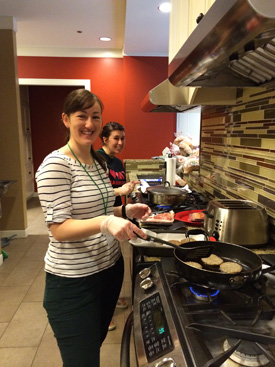 Emma Carroll
Emma Carroll As a pharmacy student, I felt volunteering at the Ronald McDonald House was a great opportunity to give back to the community, while meeting pharmacy students from Chicago State, Midwestern, and Roosevelt as well as pharmacists from all over the Chicago area. There’s no better way to get to know colleagues on a more personal level than to cook a meal with them and share the joys of volunteerism. It was so rewarding to be able to talk with new practitioners, residents, and other pharmacy students in a setting that was away from academics.
As a pharmacy student, I felt volunteering at the Ronald McDonald House was a great opportunity to give back to the community, while meeting pharmacy students from Chicago State, Midwestern, and Roosevelt as well as pharmacists from all over the Chicago area. There’s no better way to get to know colleagues on a more personal level than to cook a meal with them and share the joys of volunteerism. It was so rewarding to be able to talk with new practitioners, residents, and other pharmacy students in a setting that was away from academics.
While serving food, I had the opportunity to talk to a guest whose 4-month-old great-grandson had a heart transplant the day before. He expressed his gratitude to ICHP for making brunch and the Ronald McDonald House for providing such an amazing place to stay. He spoke about how the Ronald McDonald House is his “home away from home” while he helps care for his family. There were also children there that were patients receiving intense outpatient treatment, requiring them to be near the hospital for an extended period of time. Having the opportunity to speak to patients and families was a great reminder that each patient’s story is complex and that the families need support as well.
Erika Hellenbart
As a pharmacist and NPN member, I really enjoyed the “Meals from the Heart” volunteer event because it offered a different perspective and ability to appreciate and assist with the needs of the families in addition to the patients we typically care for. It was fantastic to be able to talk with students and residents outside of the clinic or classroom and hear their thoughts and impressions about school, residency, interviews, etc. and offer any advice I could. It was also great to see students from different schools sharing their experiences with each other. My involvement with ICHP and the NPN over the years has allowed me to become engaged in my profession and career and has provided an opportunity to meet many great pharmacists and students throughout Illinois. The Ronald McDonald House “Meals from the Heart” event was a perfect opportunity to meet and network with others while giving back to a very well-deserving community.
Thank you to all of those who volunteered for the event and special thanks to Colleen Czerniak for organizing a wonderful day!
For more information about getting involved with the New Practitioners Network, please visit:
For more information about Ronald McDonald House and Meals from the Heart, please visit:
Reference:
- Ronald McDonald House Charities Chicagoland & Northwest Indiana. 2014. [Last accessed 30 April 2014]
College Connections
My First Experience at Legislative Day
by Amber Finney P2, SSHP Secretary, Roosevelt University College of Pharmacy
Roosevelt University College of Pharmacy’s (RUCOP) Student Society of Health-System Pharmacy focuses on enhancing student learning through several diverse and unique experiences. Our chapter was given a wonderful opportunity to attend the 8th annual Under the Dome: Pharmacy Legislative Day in Springfield, IL with APhA-ASP and ACCP student chapter members, faculty advisors, and pharmacists in the community. Legislative Day, or Leg Day as it is affectionately referred to, is a collaboration between ICHP and IPhA. Leg Day provides pharmacists and student pharmacists an opportunity to talk to state legislators face to face about current legislation that will affect the profession of pharmacy. We were honored to have the opportunity to not only attend and talk over the issues with our representatives, but to also see first hand how the political system and law making bodies can potentially enhance the future of pharmacy.
The day started out very early in the morning. RUCOP students rode on a bus to Springfield alongside other pharmacy students from Rosalind Franklin, UIC and Midwestern University, as well as faculty advisors and pharmacists. This bus ride enabled us to discuss the three bills that were currently on the docket that would affect the profession of pharmacy. These bills included: SB1934 - which addresses the interchangeability of biosimilar drugs, SB3277- which would enable pharmacists to help in vaccinating children against meningococcal disease, and HB4230/SB2674 - which addresses stable funding for the Illinois Poison Control Center. When all the students came together in Springfield at the Hoogland Center for the Arts, we participated in a CPE Legislative Orientation presented by Mr. Scott Meyers, Executive Vice President of Illinois Council of Health-System Pharmacists, and colleagues. This session gave us further information on the lawmaking processes and specific talking points regarding the three bills. After the orientation, we were separated into groups based on voting districts, and each group was able to enter the capitol building for floor tours of the House and Senate as well as legislator meetings. Our group had the pleasure of meeting with Carol Sente, a representative from Buffalo Grove, and had the opportunity to answer some of her questions regarding the funding for the Illinois Poison Control Center. At the end of our conversation, it was amazing to hear that we had enhanced her understanding about the issue from a viewpoint she had never considered, and that we may have helped her to reach a decision on how she would vote.
If, for any reason, a legislator was not in their office, we left behind some information regarding our thoughts on the particular bill as well as an invitation to the reception later that evening that was held in their honor. The evening reception gave us the opportunity to speak with representatives that we may have missed talking to earlier, in a much more relaxed and informal environment, as well as opportunities for networking with other pharmacists, student pharmacists, and others dedicated to the profession of pharmacy.
After a very exhausting and exhilarating day at the Capitol, our chapter would jump at the opportunity to attend Legislative Day again next year. Personally, I am not a very politically-oriented person, and was a bit intimidated about participating; however I am pleased with my experience. Attending Legislative Day taught me much about what goes into passing healthcare-related laws that affect the profession of pharmacy. Now that I know more about Legislative Day and the impact that we, as professionals, can have on the law making bodies in our community, I would definitely attend Legislative Day in the future and would educate myself more regarding the current topics in legislation prior to attending. For anyone planning to attend next year, I would give just this advice: know the current political issues facing pharmacists and research them thoroughly prior to attending. As Pharmacy students and SSHP members, we now know that reaching out to the legislators to educate them and answer questions regarding bills will affect not only pharmacy, but healthcare as a whole.
Meals from the Heart – A Reflection from the Heart
by Carrie Park, P2, ICHP Historian, Midwestern University Chicago College of Pharmacy
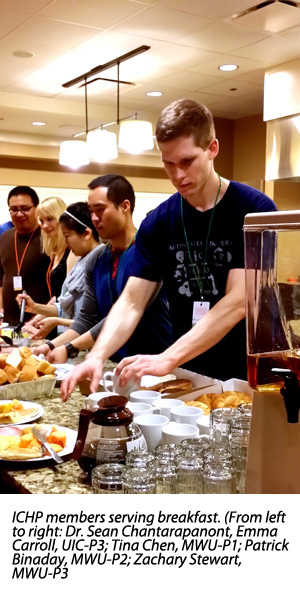 As a second year pharmacy student, I can say that my daily life consists of all things pharmacy: attending lectures, studying for exams, and participating in healthcare volunteer services. When ICHP members of the Midwestern University Chicago College of Pharmacy received an invitation from ICHP member, Dr. Colleen Czerniak about an opportunity to serve patients in a different aspect, though not knowing what to expect, we were thrilled to jump aboard.
As a second year pharmacy student, I can say that my daily life consists of all things pharmacy: attending lectures, studying for exams, and participating in healthcare volunteer services. When ICHP members of the Midwestern University Chicago College of Pharmacy received an invitation from ICHP member, Dr. Colleen Czerniak about an opportunity to serve patients in a different aspect, though not knowing what to expect, we were thrilled to jump aboard.
Student pharmacists from various ICHP chapters, along with practicing pharmacists, participated in the Meals from the Heart program by visiting the Ronald McDonald House in Chicago, Illinois. The House aims to serve families of children with complex medical needs who require long-term hospitalization. In order to help family members in their time of greatest need for emotional and possibly financial support, the Ronald McDonald House provides a “home away from home.” The Meals from the Heart program helps these families receive home-cooked meals prepared by volunteers from the Chicagoland community each day.
ICHP members were assigned to make breakfast for the families currently residing in the Ronald McDonald House. In order to provide the families with a wide array of food, each individual was responsible for bringing a specific breakfast item to cook. Upon arriving at the Ronald McDonald House, we were introduced to the friendly staff as well as the impressive kitchen. Members helped one another make stacks of pancakes, scramble dozens of eggs, and fry bacon, among an eclectic collection 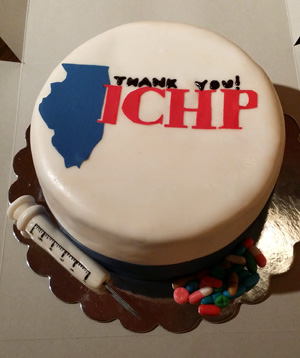 of breakfast food. During breakfast time, volunteers helped serve the prepared food to the family members. After cleaning the used kitchenware, we were given a tour of the Ronald McDonald House.
of breakfast food. During breakfast time, volunteers helped serve the prepared food to the family members. After cleaning the used kitchenware, we were given a tour of the Ronald McDonald House.
Located in the heart of Chicago, the House delivered a remarkable view of the city. There were many rooms catered to all family members: a meditation room stocked with religious books for those who wish to have peace of mind, countless colorful play rooms to entertain the children and their siblings, and even a gift room stocked with donated, new toys that the children could choose from and keep.
I was very grateful to partake in this volunteering opportunity alongside pharmacy students and pharmacists. This experience served as a reminder to have a thankful attitude for my circumstances and not to take many aspects of my life for granted, like time, relationships, and especially health. Preparing and serving breakfast with fellow ICHP members helped remind me of these lessons that cannot always be taught in the classroom setting. I hope to integrate what I have learned into the remainder of my pharmacy school career and to one day compassionately serve patients as a healthcare professional.
More
Officers and Board of Directors
TOM WESTERKAMP Immediate Past President224-948-1528 tom_westerkamp@baxter.com
LINDA FRED
President-Elect
Welcome New Members!
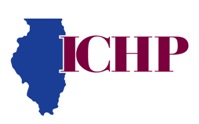
| New Member |
Recruiter |
| Claudia Muldoon |
|
| Carolyn Spiegel |
|
| Nicole Vivacqua |
|
| Rick Szparkowski |
Jenny Szparkowski |
| Prani Paka |
|
| Brian Pham |
|
| Samantha Allore |
Bernice Man |
| Soujanya Rao |
Ann Jankiewicz |
| William Brown |
|
ICHP Pharmacy Action Fund (PAC) Contributors
Names below reflect donations between June 1, 2013 and June 1, 2014. Giving categories reflect each person's cumulative donations since inception.
ADVOCACY ALLIANCE - $2500-$10000
Edward Donnelly
Dave Hicks
Frank Kokaisl
Michael Novario
LINCOLN LEAGUE - $1000-$2499
Scott Bergman
Kevin Colgan
Ginger Ertel
William McEvoy
Scott Meyers
Michael Rajski
Carrie Sincak
Michael Weaver
Patricia Wegner
Thomas Westerkamp
CAPITOL CLUB - $500-$999
Rauf Dalal
Linda Fred
Ann Jankiewicz
Kathy Komperda
Despina Kotis
Mary Lynn Moody
UIC Student Chapter
Jill Warszalek
GENERAL ASSEMBLY GUILD - $250-$499
Margaret Allen
Pete Antonopoulos
Michael Fotis
Janette Mark
Jennifer Phillips
Edward Rainville
Heidi Sunday
SPRINGFIELD SOCIETY - $100-$249
Jennifer Arnoldi
John Esterly
Travis Hunerdosse
Carrie Vogler
Marie Williams
Cindy Wuller
William Wuller
GRASSROOTS GANG - $50-$99
Susan Berg
Jennifer Ellison
Tory Gunderson
Robert Hoy
Mike Koronkowski
Evanna Shopoff
Jerry Storm
CONTRIBUTOR - $1-$49
John Chaney
Irvin Laubscher
Zakarri Vinson
Upcoming Events
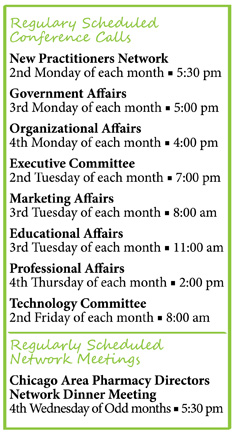
Tuesday, July 1
Deadline for submissions 2014 Best Practice Award
Thursday, July 17 at 12:00pm & Tuesday, July 22 at 3:00pm
Champion Webinar: "Low T" and Testosterone Therapy: the Good, the Bad, and the Ugly
LIVE Webinar
Monday, August 6
ICHP Central Region Family Night at the Ballpark
Springfield Sliders vs. Danville Dans
Robin Roberts Stadium at Lanphier Park | Springfield, IL
Thursday, September 11 - Saturday, September 13
ICHP 2014 Annual Meeting
Drury Lane | Oakbrook Terrace, IL

Print Entire Issue



 President's Message
President's Message Directly Speaking
Directly Speaking Congratulations to Alexandra Habanek and Nadiyah Chaudhary on winning student awards at University of Illinois College of Pharmacy! (Pictured at right with ICHP President, Mike Fotis.)
Congratulations to Alexandra Habanek and Nadiyah Chaudhary on winning student awards at University of Illinois College of Pharmacy! (Pictured at right with ICHP President, Mike Fotis.) Congratulations to these ICHP members on winning awards at Midwestern University Chicago College of Pharmacy!
Congratulations to these ICHP members on winning awards at Midwestern University Chicago College of Pharmacy! Kathy Komperda received the Preceptor of the Year Award.
Kathy Komperda received the Preceptor of the Year Award. Christie Schumacher received the New Preceptor Excellence Award.
Christie Schumacher received the New Preceptor Excellence Award. Sheila Wang received the PS3 Teacher of the Year Award.
Sheila Wang received the PS3 Teacher of the Year Award. Emma Carroll
Emma Carroll As a second year pharmacy student, I can say that my daily life consists of all things pharmacy: attending lectures, studying for exams, and participating in healthcare volunteer services. When ICHP members of the Midwestern University Chicago College of Pharmacy received an invitation from ICHP member, Dr. Colleen Czerniak about an opportunity to serve patients in a different aspect, though not knowing what to expect, we were thrilled to jump aboard.
As a second year pharmacy student, I can say that my daily life consists of all things pharmacy: attending lectures, studying for exams, and participating in healthcare volunteer services. When ICHP members of the Midwestern University Chicago College of Pharmacy received an invitation from ICHP member, Dr. Colleen Czerniak about an opportunity to serve patients in a different aspect, though not knowing what to expect, we were thrilled to jump aboard. of breakfast food. During breakfast time, volunteers helped serve the prepared food to the family members. After cleaning the used kitchenware, we were given a tour of the Ronald McDonald House.
of breakfast food. During breakfast time, volunteers helped serve the prepared food to the family members. After cleaning the used kitchenware, we were given a tour of the Ronald McDonald House.

